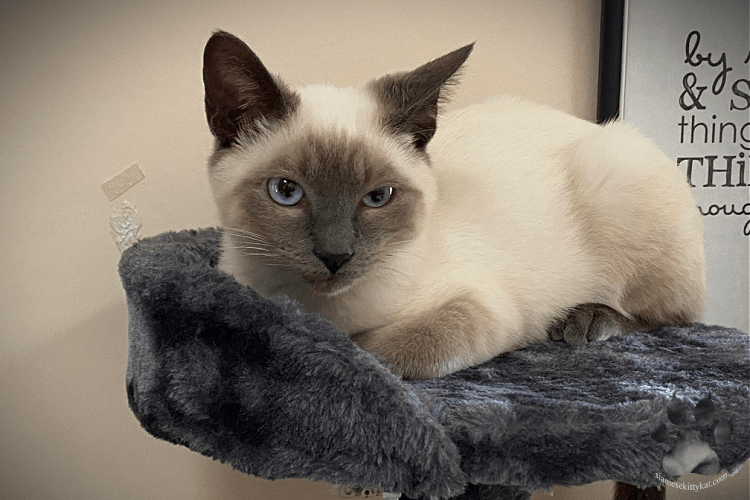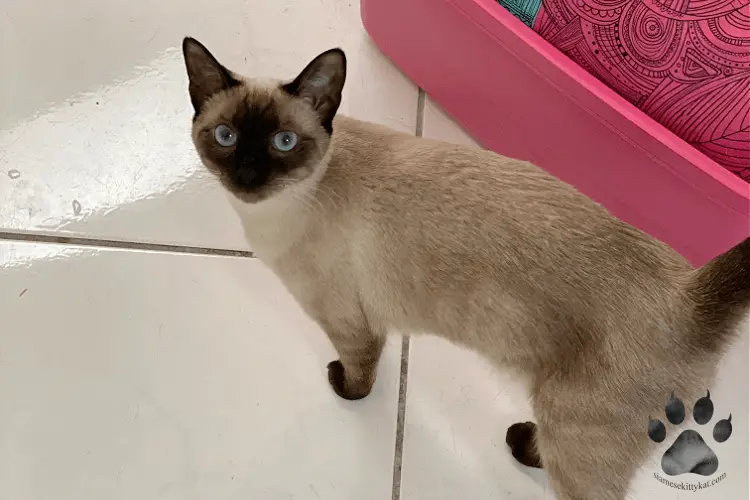The question of whether cats get annoyed has stumped cat owners time and time again. Cats are complex creatures with complex emotions. It is not always easy to tell when they are frustrated, as they do not express themselves as humans do.
Fortunately, there are sure signs to help us decode the behavior of our furry friends.
Take my Siamese cat, Robyn, for example. She loves to curl up on my lap and will often purr as she snuggles close. However, her meows become insistent when it’s her mealtime, and I haven’t fed her yet!
This is usually accompanied by pawing at my arm to get my attention. This is definitely a sign that Robyn is getting impatient!
Let’s explore in this article whether Siamese cats get annoyed. Let’s also examine the body language clues that could help us discern their true feelings.
Keep reading to learn more!
How Do You Tell if a Siamese Cat is Annoyed?
Here are some tips on how you can tell if your cat is annoyed:
1. Look at your cat’s ears
One of the most common signs of a displeased cat is its ears. A feline’s ears are sensitive to sound and movement. They often flatten back against their head when they feel uncomfortable.
My Siamese cat, Batman, is always the moodiest of cats. He could switch from happy and playful one moment to annoyed and grumpy the next. It took me a long time to figure out when he was annoyed. But once I did, it made living with him much easier.
All I have to do is take a quick look at his ears. He’s calm and content if his ears are relaxed and pointing forward. However, Batman’s ears will go into ‘airplane mode,’ as I like to call it, whenever he gets mad about something. They will flatten against his head. This usually happens if someone pets him too roughly or disturbs him while sleeping.
It became second nature for me to scan Batman’s ears whenever he seemed unhappy or agitated.
2. Watch your cat’s eyes
Another noticeable sign your cat may be annoyed is a change in their eye expression. A cat’s eyes can say a lot about its emotional state. Thus, pay attention to whether your cat’s pupils are larger or smaller than usual.
3. Listen for excessive meowing or growling
Cats communicate with their humans through vocalization. Growling is a sure sign that something has put your cat in a bad mood. This behavior usually means they want some space and don’t want to be disturbed.
4. Keep an eye out for aggressive behavior
Cats don’t lash out unless they feel threatened. Your cat has likely
reached his boiling point if you notice aggressive behavior like biting or hissing.
5. Pay attention to your cat’s tail
One of the most common indicators of a cat’s annoyance is its tail position. A cat’s tail will lash back and forth in an almost dog-like wagging motion when it feels agitated. This isn’t indicative of happiness like it would be with a dog. Instead, the tail movement indicates your cat is upset.
6. See if your cat is hiding
Cats have an instinctive need for privacy and often hide if they feel upset or threatened.
They may become more distant, going out of their way to avoid being around you. Your cat may feel bothered by something you have done or said. He prefers staying elsewhere than following you around the house as a result.
7. Check if your cat has decreased appetite
Cats often refuse food offered by humans as a form of protest when they aren’t pleased with something. It could mean she’s angry if your kitty turns down treats and meals.
8. See if your cat stops bringing you presents
Cats may bring toys or dead animals as gifts for their favorite people. When your kitty has stopped this behavior, it may be a sign they are angry with you or feel taken for granted.
9. See if your cat begins to fluff up his fur
A cat is upset when its fur puffs up and takes on a larger, more intimidating form. It’s often accompanied by an arched back.
They hope to ward off any perceived threats or danger by making themselves appear bigger. Take this as a warning sign and back away slowly.
What Annoys a Siamese Cat?

Cats, in general, can be easily annoyed by certain situations. Siamese cats’ temperament can often make them more sensitive. It is crucial to understand what could annoy your feline friend.
1. Vacuum Cleaners
It’s time for your cat to hide when you pull the dreaded vacuum cleaner out of the closet! Vacuums produce loud noise and vibration that can startle cats and cause anxiety. Additionally, most cats don’t like strange objects moving around their feet.
It is best to keep your cat in another room while you do your cleaning, if possible.
As Batman hears the sound of a vacuum cleaner being switched on, he lets out an angry yowl. His fur will stand up on end, and he will begin hissing at the poor machine like it has done something wrong. Sometimes, he will chase after the machine as if it is his prey.
2. Loud Noises
Siamese cats are sensitive to sound, so clanging or shrieking noises will make them panic. They may start growling or hissing to ward off the noise. Loud firework displays and thunderstorms can worry cats, as they may be too loud for their ears.
Try providing your cat a safe zone where she can take refuge until the noise subsides. This can be a quiet room with plenty of blankets and toys.
3. Car Rides
Another thing that annoys a Siamese cat is car rides. Cats generally don’t like changes in their environment, and riding in a vehicle can be stressful for them. Try to keep it as short as possible if you must take your Siamese cat on a car ride for whatever reason. Make sure to provide plenty of blankets or comfortable bedding for the trip.
4. Cages
No one likes feeling trapped, including cats! Cages can annoy
Siamese cats, since they prefer to explore their environment without feeling confined.
5. Too Much or Too Little Attention
Siamese cats are quite social and crave attention from their owners. They want to be petted, played with, spoken to, and snuggled regularly. They will meow or scratch the furniture if they need more attention from you.
On the flip side, too much attention can also bother them, as they prefer moments of solitude from time to time. Finding a balance between giving them love and allowing alone time is crucial.
6. Being Picked Up
Some Siamese cats don’t like being picked up unless it’s on their own terms. Respect your cat’s wishes by allowing them to come up to you if they want cuddles. Never force yourself when they’re not interested in physical contact.
My Siamese cat, Robyn, enjoys being held every now and again. But she will give a loud hiss followed by some swipes with her claws if I surprise her with it. These are obvious indicators that it was not something she wanted right then.
Siamese cats also find it irritating when people try too hard to
‘entertain’ them with toys or activities that don’t interest them. Playtime is essential, but not every activity will appeal to your feline friend. Let them choose which games they want to engage in.
7. Bells
Belled collars seem like an adorable way to track your cat’s whereabouts, but it can be annoying for them. Cats have sensitive hearing, and a bell’s sound frequency can irritate them or cause stress.
There are other options, such as using GPS tags or microchips, if you need to keep track of your cat’s location.
8. Sticky surfaces
Sticky surfaces on furniture or countertops will likely frustrate a Siamese cat. This is an annoying deterrent for them to explore surfaces with their paws and claws. It also dries out their skin, which can be uncomfortable for them.
9. Smells

Scents have one of the biggest effects on Siamese cats. Unfortunately for them, the scents they hate are ones that most people find pleasant.
Citrus scents like lemon and lime bother them the most. Other strong smells like rosemary and thyme should also be avoided. Lavender and eucalyptus are scents that don’t agree with your feline friend either.
10. Strangers
Most Siamese cats don’t take kindly to strangers entering their territory uninvited. This is true, especially if those strangers happen to be children. Introduce new people slowly, and give your cat plenty of time to get used to them.
11. Spoiled food
Spoiled food is another major annoyance for Siamese cats. These cats are fastidious eaters who prefer fresh meals every day. Your cat will likely turn up its nose if you leave food out too long.
Try to serve them freshly prepared meals made with quality ingredients whenever possible.
12. Being stared at
Making prolonged eye contact is considered aggressive behavior in cats. It’s best to avoid staring at your Siamese for too long because this can make them feel uncomfortable.
Ensure everyone interacting with your cat knows to avoid making direct eye contact. Encourage them to look away or blink their eyes, so your pet feels more relaxed and comfortable around people.
13. Medicine
One of the biggest annoyances for cats is having medication forced upon them. Many owners find it hard to give medication without them foaming at the mouth or spitting it back out.
The best way to get around this is to consult your vet. You can determine what kind of medication will work best for your cat this way.
14. Dirty Litter Boxes
Siamese cats do not enjoy stepping into a dirty litter box. They often express their displeasure with loud meowing or actively avoiding the area. It’s best to scoop out the litter box at least once daily, or more often if you have many cats.
Siamese cats can get annoyed, like any other cat. They may become irritable if their needs are not met.
They may also show signs such as hissing or biting. The best way to determine if your cats are annoyed is by monitoring their behavior.
Keep in mind that cats are prone to mood swings, regardless of breed. Sometimes, they need quiet time to relax and return to their usual selves.
Want to immerse yourself more in the captivating world of Siamese cats? I’ve got all the information you need from their distinct color points to their fun personalities: Siamese Cats: Unique Features and Personality
